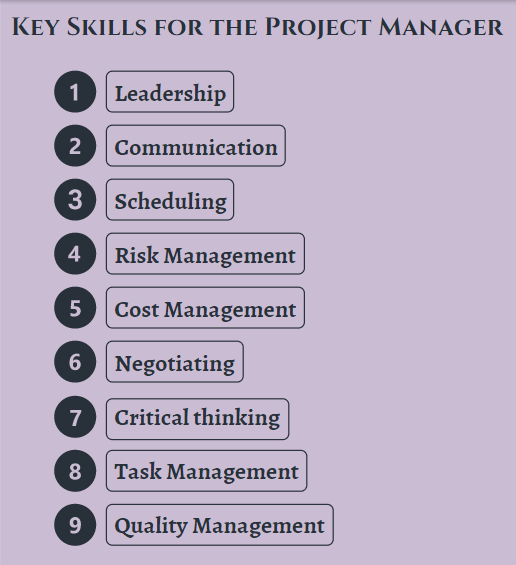Project management is a multifaceted discipline that requires a blend of technical, interpersonal, and organizational skills. The success of a project often hinges on the proficiency of the project manager in various domains. Drawing from extensive academic training and practical experience, this article delves into the critical skills every project manager must possess to steer projects toward successful completion.
1. Leadership and Team Management
A project manager must be an effective leader who can inspire and guide their team towards common goals. Leadership involves more than just giving orders; it includes:
- Visionary Thinking: Setting a clear vision and direction for the project.
- Motivation: Encouraging team members to achieve their best.
- Conflict Resolution: Addressing and resolving conflicts swiftly and fairly.
- Empowerment: Delegating tasks and giving team members the autonomy to make decisions.
2. Communication
Clear and effective communication is the backbone of successful project management. A project manager must:
- Facilitate Clear Communication: Ensure all stakeholders are on the same page.
- Active Listening: Understand the needs and concerns of team members and stakeholders.
- Regular Updates: Provide consistent project status updates to stakeholders.
- Negotiation Skills: Navigate through conflicting interests and find mutually beneficial solutions.
3. Time Management
Managing time efficiently is critical in keeping the project on track. This involves:
- Prioritization: Determining the most important tasks and focusing on them.
- Scheduling: Creating detailed project timelines and adhering to them.
- Deadline Management: Ensuring that all project milestones are met on time.
4. Risk Management
Every project carries inherent risks. Effective project managers must:
- Risk Identification: Proactively identify potential risks early in the project.
- Risk Analysis: Evaluate the potential impact of identified risks.
- Mitigation Strategies: Develop plans to mitigate risks or respond effectively if they occur.
- Contingency Planning: Have backup plans ready for critical scenarios.
5. Budget Management
Keeping the project within its financial limits is a key responsibility. Skills required include:
- Budget Planning: Developing a comprehensive budget that covers all project aspects.
- Cost Estimation: Accurately forecasting costs to avoid budget overruns.
- Financial Tracking: Monitoring spending to ensure adherence to the budget.
6. Quality Management
Delivering a high-quality product or service is paramount. This involves:
- Quality Planning: Defining quality standards and how they will be achieved.
- Quality Assurance: Implementing processes to ensure quality standards are met.
- Quality Control: Continuously monitoring and adjusting processes to maintain quality.
7. Technical Proficiency
Understanding the technical aspects of the project can greatly enhance a manager’s effectiveness. This includes:
- Industry Knowledge: Being well-versed in the specific industry of the project.
- Technical Skills: Understanding the tools and technologies used in the project.
8. Problem-Solving and Critical Thinking
Projects rarely go exactly as planned. A project manager must be adept at:
- Identifying Problems: Recognizing issues as they arise.
- Analyzing Problems: Understanding the root causes of problems.
- Developing Solutions: Crafting effective solutions to overcome obstacles.
- Decision Making: Making informed decisions quickly and confidently.
9. Adaptability and Flexibility
Projects often change in scope and direction. A successful project manager must:
- Adapt to Change: Be open to changes and ready to pivot as necessary.
- Flexible Planning: Adjust plans and strategies in response to new information or changes in the environment.
10. Stakeholder Management
Managing relationships with all stakeholders is crucial. This includes:
- Identifying Stakeholders: Recognizing all parties with an interest in the project.
- Understanding Needs: Understanding the expectations and needs of stakeholders.
- Engagement: Keeping stakeholders informed and engaged throughout the project.
- Managing Expectations: Ensuring that stakeholder expectations are realistic and aligned with project goals.
Conclusion
The role of a project manager is complex and demanding, requiring a broad set of skills to navigate the challenges and intricacies of managing projects. By mastering these essential skills, a project manager can significantly enhance their effectiveness, leading their projects to successful outcomes and creating value for all stakeholders involved. Whether honed through rigorous academic programs or refined through years of practical experience, these skills are the cornerstone of proficient project management.
